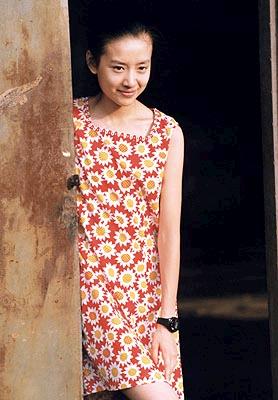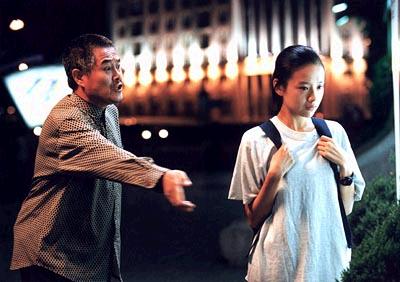

Earlier in his career, Zhang Yimou favored telling stories that were on an epic scale, set in the past of China. Films like Raise the Red Lantern, Ju Dou, and Shanghai Triad helped establish Zhang as well as the Chinese film industry. Lately, Zhang is favoring modern (more or less), more intimate stories like the ones in The Road Home and Not One Less. Happy Times, based on the novel by Mo Yan, the story of a man looking for a wife, and the relationship he forms with a young blind woman, continues this trend. At times, Happy Times seems so unabashedly good-natured that it almost seems sappy. Zhang counters this with characters that are unlikable at times, and a dry sense of humor not usually present in his films.
Zhao (Zhao Benshan, The Emperor and the Assassin, Male Director for Female Affairs) is the man on the hunt for a wife. The beginning of the film shows him in negotiations with a large woman (Dong Lihua). He tells her he is sick of skinny women, when in reality it is the skinny women that reject him. He chose her because he is moving on in years and wants a wife, and thinks that she will be easier for him to catch. Zhao exaggerates his net worth, saying that he is the general manager of the Happy Times Hotel. In actually, the Happy Times Hut is an abandoned bus that Zhao and his friend refurbished in the hopes that young lovers will pay for a private place for trysts. This woman has a blind stepdaughter that she obviously dislikes. She convinces Zhao to take Wu Ying (Dong Jie) and give her a job at the Happy Times.
Zhao's problem is that he has to keep lying to stay in this woman's favor, and each lie he makes causes him to dig himself deeper into this hole he created. He figures that it will be easy to lie to Wu, since she is blind. However, once he begins spending time with Wu, he begins to see the entire picture. Things are not exactly as he was told, and he is at a crossroads. His affection for Wu is growing, but he still wants to marry. These goals are at odds with one another. He can either appease the woman, whom he is beginning to dislike, and cause Wu more suffering, or help Wu and, as a consequence, lose his potential marriage. The more time he spends with Wu, the more he bonds with her in a paternal way. Yimou takes the time to show their relationship develop from one of extreme mistrust to one of genuine affection.
Gui Zi's screenplay roams into territory that is almost ridiculous in Zhao's attempts to make Wu happy. He is not willing to break the lie he gave, especially after seeing how happy Wu is away from her house. Dong's performance is especially strong (she is not blind in real life). She is also stick thin (she has a background in ballet), which contrasts to her stepmother and stepbrother who are grossly fat. Her stepbrother is a spoiled "little emperor," doted on by his mother. One way to observe Wu's neglect is through her weight. She looks like she will collapse at any moment. Just when it looks like the story is going on a specific direction, Yimou shifts gears and gives it a more realistic bent. This may not satisfy everybody, but it does serve to temper the saccharine-like mood present for most of the film.